Here in Tennessee it can be too hot to turn on the kitchen oven or stove in the summertime, so many people grill outdoors to cook up steaks, hamburgers, chicken, hotdogs, and other BBQ favorites.
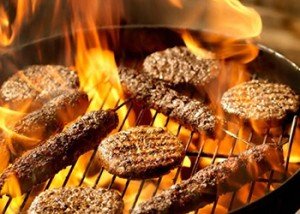
As a result of over 800,000 chemicals introduced into every aspect of our environment since World War II, there are many carcinogens that we cannot control. However, what we can do is eliminate or at least minimize certain carcinogenic compounds if we first know what they are and how they occur.
This article will discuss how you can significantly reduce exposure to carcinogenic compounds when food is under high heat and grilled: at home, an outdoor barbecue event, or when you eat out at restaurants. Although information is available on this critical subject (it’s even mentioned on the National Cancer Institute’s website), much of the information provided below is not widely known and is not publicized, especially to the degree that it needs to be.
For clarification, there is a type of barbecuing that uses low-heat smoke to cook “low and slow” for a long period of time. Barbecuing as referenced in this article, however, refers to cooking over an open flame, usually outdoors. This is synonymous with what most think of as barbecue at outdoor events, on their porch, or in their backyard. As you will see, low and slow is a much safer and gentler way to cook animal foods.
Problems With Grilling
There are many studies that have isolated three specific carcinogenic compounds caused by grilling, high heat cooking, and overcooking animal foods: polycyclic aromatic hydrocarbons (PAHs), heterocyclic amines (HCAs), and advanced glycation end products (AGEs).
Polycyclic Aromatic Hydrocarbons (PAHs)
PAHs are a group of over 100 chemicals that form when the fat from meat drips onto the flame or hot coals and creates smoke. That smoke, which many consider a flavor enhancer from grilling, is absorbed with those carcinogenic PAHs by the food. PAHs have been linked to increased risk of bladder and lung cancer.
Not only is eating carcinogenic PAHs likely, so is breathing them into your lungs if you’re getting a face full of smoke. From the lungs, the PAHs go into your bloodstream, which then circulates them throughout your body to various organs.
Furthermore, cooking on a grill where fat drippings have accumulated over time on the grill itself, hot metal parts, coals, or gas flames, increases the chances of producing PAH carcinogenic smoke.
Heterocyclic Amines (HCAs)
When cooked at extremely high temperatures, HCAs are carcinogens produced directly within food. This is true no matter what the cooking method: barbecuing, stove top cooking, or oven roasting or broiling. HCAs form when creatine (found in muscle) and amino acids (found in protein) react at temperatures above 300 degrees Fahrenheit (about 150 degrees Celsius.)
HCAs have been linked to increased risk of colorectal, prostate, and pancreatic cancers. Cooking foods low and slow will help to avoid creating HCAs.
Advanced Glycation End Products (AGEs)
Protein (or fat) plus heat plus sugar may be a “troublesome trio.” When cooked at high heat, a chemical reaction takes place between protein or fat and sugar which creates toxins called advanced glycation end products (AGEs). AGEs are created through what is called the Maillard reaction between sugars and free amino groups of proteins, lipids (fat), or nucleic acids.
AGEs, also known as glycotoxins, contribute to increased oxidative stress and inflammation, which are linked to diabetes, Alzheimer’s, cardiovascular disease, and cancer. The acronym AGEs is appropriate because advanced glycation end products accelerate aging.
Healthy Grilling Tips: How to Eliminate or Reduce Grilled Carcinogens
A few prudent measures will allow you to eliminate or reduce most of these carcinogens when grilling or eating any grilled food, including at restaurants. Below is a list of suggestions that I’ve broken down for you into three sections: Before You Grill, While You Grill, and The Food You Grill.
Before You Grill
- Marinate meat using natural, antio
xidant ingredients… A 2012 study found that a high antioxidant marinade of chili pepper, thyme, rosemary, garlic, and ginger reduced HCAs by 74 percent. You can reduce AGEs by using an acidic marinade that contains lemon juice and/or vinegar. Black pepper, allspice, and/or chives can also provide powerful protection against carcinogens.
Make your own high antioxidant marinade or rub that contains a combination of these ingredients. Caution: do not add sugar or honey into your marinade sauces. Thick commercial marinades that contain honey, sugar, or corn syrup create three times more HCAs than grilling without marinades.
Brands such as Frontier, Whole Foods Market, and MountainRoseHerbs.com sell non-irradiated herbs. There are many other non-irradiated brands as well. Grocery stores usually carry poor quality brands in plastic containers that are irradiated. Tip: Don’t expect to see “irradiated” on the label. Assume that if it doesn’t say “non-irradiated” that the herbs are indeed irradiated.
You’re best off purchasing organic spices in glass bottles for your high antioxidant rub or marinade. Organic spices are likely higher in antioxidant “power” and won’t be irradiated. To be sure, look for the words “non-irradiated” on the container.
- Add fruit to ground meat, poultry, or pork… Researchers at Michigan State University found that adding cherries, a great source of antioxidants, to ground beef prior to pan frying reduced HCAs by about 70 percent. The researchers suggested mixing a cup of chopped tart cherries with a pound of ground beef. Make sure you remove the cherry pits!
You can do the same with other anti-oxidant-rich red and blue fruits such as blueberries, blackberries, raspberries, etc. Combining antioxidants often increases their beneficial effect.
- Clean your entire grill… If you want to mitigate th
e damaging effects of PAHs, it is wise to clean your grill completely and not just the grill surface itself. A warm grill will allow for easier cleaning. Make sure you use a grill cleaner that is non-toxic.
- Trim the fat… When fat drips onto an open flame, carcinogens are produced. Trimming as much fat as possible before you cook will reduce PAH production and lower HCAs.
- Partially cook food before putting it on the grill… This will reduce grilling time and exposure to carcinogenic compounds.
- Use non-toxic coals and avoid those that contain chemicals… Chemicals in coals help them ignite easily and/or burn more evenly. These chemicals can also be toxic and carcinogenic. The same is true for the igniting fluid that is often used to douse on coals to get them started more easily.
Fortunately non-toxic coals are available in health food stores, Whole Foods Market, and Trader Joe’s (in the US), some supermarket food chains, and/or outdoor grill supply stores. Lazzari makes a variety of non-toxic choices and Greenlink Charcoal makes coconut shell briquette charcoal that just may be the safest I have found.
While You Grill
- Slow down and cook under low heat… Slow cooking under low heat may take longer, but it is the best way to cook animal foods, no matter what the method of cooking. Lower heat is always a good idea while grilling and will help you to reduce carcinogenic HCAs and PAHs.
Another way to reduce the heat your food is exposed to is to place food further away from the flame on a higher grill top. Many grills have two levels or you can buy a grill stand at any store that sells barbecue supplies. Lastly, placing food on a cedar plank can also reduce the food’s cooking heat.
- Keep it cool… Well not really “cool,” but try to keep the temperature from getting too hot. How hot is too hot? Over 300 degrees Fahrenheit or 150 degrees Celsius is dangerous regardless of what cooking medium is used. Some gas grills come with temperature gauges, but those that don’t can be fitted with one.
- Keep it rare and avoid well-done meat… Cook meat rare or medium-rare, instead of well-done. Shockingly, well-done meats contain up to 3.5 times the levels of HCAs as meats cooked to medium-rare according to one major study. Rare meats also contain more enzymes than meats that are well done.
Eating organic, pasture-raised animal foods will be healthier and beef (not poultry or pork) can be cooked rare with little risk of harmful bacteria. It is best if the meat’s internal temperature does not exceed 160 degrees Fahrenheit or 70 degrees Celsius. A meat thermometer, stuck into the meat, can be used while cooking as a temperature gauge.
- Flip frequently… Flipping frequently helps avoid charring and reduces HCA production.
- Grill smaller pieces… These take less time to cook and HCAs will likely have less time to form.
- Avoid pressing down on meat with your spatula… Pressing down on meat will increase the fat drippings on the grill, thus creating higher temperatures and HCAs. More smoke will create PAHs.
- Avoid charred food… If meat or any other animal food is charred,
it is carcinogenic. Never eat the black or brown parts. Personally, I would never eat charred food of any kind.
The Food You Grill Makes a Big Difference Too
- Get rid of Porky the pig… The type of animal food grilled also influences HCA levels. Grilling pork creates the most HCAs and bacon is the worst. Although it’s unlikely that you’d put bacon strips on an outdoor grill, cooking bacon on a stove top at high heat is not advised.
- Grilling fish and shrimp is better… Fish and shrimp produce much fewer HCAs from high heat exposure, and their lower fat content minimizes fat drippings to reduce PAHs from smoke. Throw on all the wild ocean shrimp you want on your grill. Keep in mind that most farmed shrimp has other health issues and should be avoided. Next to grilling shrimp and fish, grilling chicken creates lower HCAs.
- Avoid processed meats… Meats processed with nitrates are already carcinogenic even before they’re grilled or cooked. These include almost all frankfurters, sausages, and bratwursts. Avoid them unless you are certain they are nitrate free.
- Grill veggie burgers that do not contain soy or polyunsaturated oils… Veggie burgers can be a great option for barbecuing. If your veggie burger contains soy protein, ensure that it is organic soy that is non-GMO (most soy grown in the US is genetically-modified). A healthier choice for veggie burgers that are soy-free and contain no polyunsaturated oils are Sunshine Burgers. (Note: vegetable oils such as soy oil, canola, sunflower, safflower, etc. increase inflammation). These taste quite good and come in a variety of flavors. Portobello mushroom burgers are another great option. You can also make your own veggie burgers. Check out the delicious veggie burger recipe below from my wife Charlene.
- Fruits and vegetables… Grilling fruits and vegetables won’t create any cancer causing compounds. However, be aware that over-cooking can increase nutrient loss from food.
Warning: Do Not Microwave Food
You may want to thaw frozen food before you grill it, however do NOT use a microwave oven to do so. Swiss and Russian scientists have proven that microwaving animal foods, even for short periods of time, can make them carcinogenic.
Microwaving heats food by agitating the water molecules in foods to the point where they’re basically ripped, altering the food’s DNA and making it toxic and carcinogenic. This is especially true with meat. (By the way, these studies were ridiculed by microwave industry groups in the US and in Europe.)
Safer, Healthier Ways to Dine Out
One of the ways restaurants are able to make more money is by turning tables faster. They do that by high heat cooking to get your food to your table quicker. As mentioned, the practice of cooking quickly over high heat is an unhealthy way to consume animal foods. Eating this type of food once in a while may be okay, but many people eat out five times a week or more.
Steak houses often chargrill over an open flame and use that to attract customers. But therein lies the carcinogenic dangers of overheating meat, chicken, pork, etc. Rib houses boast of secret barbecue sauces that are tasty, but unfortunately are highly carcinogenic, especially when grilled.
Here are some simple steps to minimize your cancer risk when eating out…
When eating a main meal out at restaurants you can order steamed fish. Steaming temperature is relatively low at 212 degrees Fahrenheit or 100 degrees Celsius. Another option is to request your food be cooked in an oven instead of on the grill.
Especially when eating grilled food, order a nice size portion of vegetables with it. Vegetables such as kale, collard greens, bok choy, broccoli, spinach, cabbage and others have cancer fighting properties, which will go a long way in helping you stay healthy, no matter what food you eat. The same is true for salads. Include dark leafy greens such as arugula and make your salad colorful with tomatoes, onions, purple cabbage, chopped carrots, etc.
You can also take specific antioxidants with meals such as ginger, turmeric, green tea extract, and/or resveratrol to mitigate the dangers of high heat food preparation.
With Any Anti-Cancer Diet, Quality of Food is Critical
The quality of food you eat is critical to your health. If you consume animal foods, make sure it is from organic, grass-fed, free roaming pasture-raised cattle, bison, pigs and chickens. Most animal foods come from factory farms that use confined animal feeding operations (CAFOs) and produce sick animals.
Because of CAFO overcrowded conditions and the poor quality food these animals eat, excess amounts of antibiotics are needed to prevent disease. Regularly consuming animals from CAFOs adds to your overall antibiotic load. Studies indicate cancer risks are higher with heavy antibiotic use. CAFO animals are also usually given steroid hormones to fatten up them quickly – another potential health risk.
In addition, factory farmed chickens are often fed carcinogenic, arsenic-laced feed to fatten them up. Unbelievably, the feces from these factory farmed arsenic-fed birds are often mixed into cattle CAFO grain mashes!
“Protective” food agencies (in the US, the FDA and USDA), pretend arsenic is safe and allow heavy antibiotic use in CAFOs. The FDA and USDA protect corporate “Big Agra” interests more than they do consumers, while the entire insidious practice of factory farming is kept secret from most consumers.
You can purchase high quality meat, poultry, and fish from health food stores, famers markets, and CSAs (Community Supported Agriculture). Local Harvest and Eat Wild are two websites that can help you find farmers markets and CSAs near you. These are great resources to have when traveling as well.
Editor’s Note: This article originally published June 2016 and was updated and republished July 2017
Article Summary
Grilling over an open flame can be a serious health hazard due to the chemical reactions that take place when animal foods such as beef, poultry, pork, and fish are cooked at high temperatures.
There are many studies that have isolated three specific carcinogenic compounds caused by grilling, high heat cooking, and overcooking animal foods: polycyclic aromatic hydrocarbons (PAHs), heterocyclic amines (HCAs), and advanced glycation end products (AGEs).
PAHs are a group of over 100 chemicals that form when the fat from meat drips onto the flame or hot coals and creates smoke. PAHs have been linked to increased risk of bladder and lung cancer.
HCAs are carcinogens that are produced directly within the food when it’s cooked at extremely high temperatures, no matter what cooking method is used. HCAs have been linked to increased risk of colorectal, prostate, and pancreatic cancers.
When cooked at high heat, a chemical reaction takes place between protein or fat and sugar which creates toxins called advanced glycation end products (AGEs). AGEs contribute to increased oxidative stress and inflammation, which are linked to diabetes, Alzheimer’s, cardiovascular disease, and cancer.
You can take the following steps to eliminate or reduce most of these carcinogens when grilling or eating any grilled food:
Before You Grill
- Marinate meat using natural, antioxidant ingredients
- Add fruit to ground meat, poultry, or pork
- Clean the entire grill before using
- Trim fat off meat before cooking
- Partially cook food before placing on the grill (but don’t microwave it!)
- Use non-toxic coals
While You Grill
- Keep the grill temperature under 300 degrees Fahrenheit or 150 degrees Celsius
- Cook meat rare or medium-rare, instead of well-done
- Flip frequently
- Grill smaller pieces, don’t press down on the meat, and never let meat burn
What You Grill
- Choose fish or seafood over pork which creates the most HCAs
- Avoid processed meats
- Choose veggie burgers that do not contain soy or other vegetable oils
- Grilling fruit and vegetables is a good choice
If you consume animal foods, make sure it is from organic, grass-fed, free roaming pasture-raised cattle, bison, pigs, and chickens. Most animal foods sold in regular grocery stores come from factory farms that use confined animal feeding operations (CAFOs) and produce sick animals that often fed antibiotics and hormones.











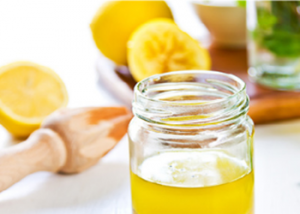 xidant ingredients… A 2012 study found that a high antioxidant marinade of chili pepper, thyme, rosemary, garlic, and ginger reduced HCAs by 74 percent. You can reduce AGEs by using an acidic marinade that contains lemon juice and/or vinegar. Black pepper, allspice, and/or chives can also provide powerful protection against carcinogens.
xidant ingredients… A 2012 study found that a high antioxidant marinade of chili pepper, thyme, rosemary, garlic, and ginger reduced HCAs by 74 percent. You can reduce AGEs by using an acidic marinade that contains lemon juice and/or vinegar. Black pepper, allspice, and/or chives can also provide powerful protection against carcinogens.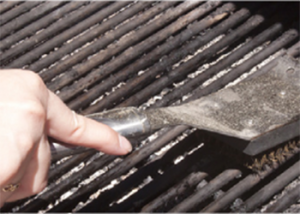 e damaging effects of PAHs, it is wise to clean your grill completely and not just the grill surface itself. A warm grill will allow for easier cleaning. Make sure you use a grill cleaner that is non-toxic.
e damaging effects of PAHs, it is wise to clean your grill completely and not just the grill surface itself. A warm grill will allow for easier cleaning. Make sure you use a grill cleaner that is non-toxic.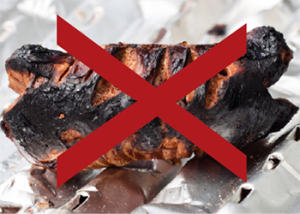 it is carcinogenic. Never eat the black or brown parts. Personally, I would never eat charred food of any kind.
it is carcinogenic. Never eat the black or brown parts. Personally, I would never eat charred food of any kind.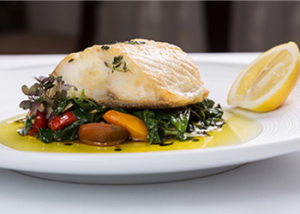









What about electric outdoor grills? Are they better or worse as far as carcinogens are concerned? And are we really never supposed to set our ovens above 300 degrees?
Godbless you and all that keep us informed Ty .
I share your love constantly repeatedly, I see people are awakening to reality and it is wonderful. I must say that it is not easy here in the UK to know if we are being lied too when they say something is organic etc . We hear that we are being conned and I certainly don’t trust easy after all the experiences I’ve had from GP’S doing much wrong and I have piles of evidence in my paperwork copies I insisted on receiving. I truly wish all you guys were here so that I could come to you all . Big hugs and keep on keeping you are a blessing to us all .. respect and love to you all . Namaste , Karen x
This is a great article. When you think of all the people who barbecue, and all of the ideas included here that can help you get away from cancer causing scenarios, this makes a big difference.
Nice work!
JOhn
I do not barbecue anything. I grill my steak, hamburgers, lamb chops, pork chops, salmon, arctic char, shrimps, and scallops in the oven. I put them in the top rack. I use olive oil, rosemary and sage for the meats, dill and parley and garlic for the fish. I always squeeze a lemon for all the food that I have grilled. I do not fry things too much, because I do not find fried food that healthy. I do use high heat for the grill, but only for 10 to 15 minutes. I find that grilled food is delicious. I do not have a microwave oven in my house.
I find this chart very useful: https://jonbarron.org/diet-and-nutrition/healthiest-cooking-oil-chart-smoke-points#.V3Mpa8spCBY
I often cook onions and garlic in water instead of oil. I knew about the dangers of heating fats, but I didn’t about the problem of heating protein/amino acids, so thank you for sharing.
Alilia
Brother Ty, God bless you and family. God be praised for blessing you and all who participate in this great work, in an effort to help people, including myself. Thanks again. I bought the book you spoke about from A to Z.
Ty,
I am surprised that your recipe for veggie burger contained soy sauce. I have read many times not to consume soy.
Mary Ann,
Agreed! Almost all soy sauce in the U.S. contains MSG, which is horrible for our health in many ways. MSG is also found in Worcestershire Sauce. Be sure to know all of the alternative names for MSG when reading labels. A better alternative to soy sauce is coconut aminos. Same flavoring, but much better for you. Just goes to prove a person must check every ingredient when cooking because one simple slip can mess the whole thing up! Thanks Ty for the alternative burger recipe. I also learned many new things with this article. Keep up the great work. Information is power.
Mary Ann, I find that Chinese food contains so much MSG. When I eat my spring rolls, chicken fried rice, and stir fry, it is fine, when I eat a little bit. After I eat too much of it, it makes me a bit nauseous. When I buy Chinese take-out or eat at a Chinese restaurant, they add too much salt on the food that makes me thirsty. I barely use Worcestershire sauce, except for a tablespoon in my meat pies, but I seldom make meat pies anyway.
Great job TY! You are doing a prophets work, a voice crying in the wilderness . We are seeing increases in so called diseases that were not there 40 yrs ago! It would be interesting study to look at other society’s, who don’t eat what we do, and see if they have the same problems?
Thank you very much, & God Bless you. I learned a lot and it all make sense. We all appreciate how you are awakening us all for the most necessity thing in life(food). Love, peace, and serenity be with you.
I use my pressure cooker almost every day. Does pressure cooking meats cause cancer?
Hi there –
Using your pressure cooker on low heat or using a steamer is actually a great way to preserve the vitamins in your food when cooking it.
Hope this helps!